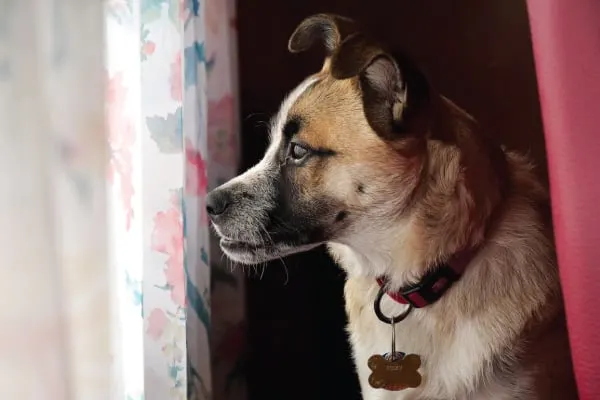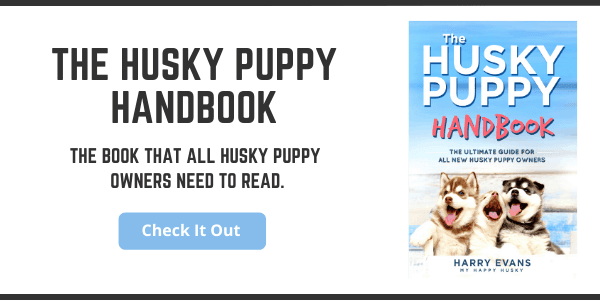If your puppy has an underbite, you’re probably curious if it can be fixed.
In this guide, we’ll give you the answers and cover important questions that owners often ask. We even had our veterinarian help with some of the info
The short answer is yes, but only under certain circumstances. Vets will typically only offer solutions if it causes the puppy pain or makes eating, drinking, or breathing difficult. Solutions include braces, surgery or extraction and filling.
Other than this, it’s unlikely that veterinarians will advise anything be done about a puppy’s underbite.
Table of Contents
The Problems of an Underbite in Puppies
An underbite in puppies, otherwise known as canine malocclusion is when the lower jaw (mandible jaw) protrudes further out than the upper jaw (maxilla jaw).
Sometimes, an underbite will not cause any health issues, and other times it can be more serious.
In the more unfortunate cases, If the underbite is bad it could lead to significant eating disorders, misaligned teeth that could damage the soft tissue around the mouth and gums, and finally and likely the worst outcome could be a condition called an oronasal fistula.
This condition is where a hole forms between the mouth and nose, this causes severe pain and makes your puppy very vulnerable to nasal disease and infections.
When there are no issues:
Sometimes, having an underbite might not be a big deal. If it doesn’t bother your puppy’s everyday life, there might be no need to do anything about it. But it’s best to get a professional opinion after a closer look.
Generally, if your puppy doesn’t have difficulty eating, swallowing, drinking and isn’t in pain, it’s likely to be less serious. But you should let a veterinarian make that decision.
Causes of Underbites in Puppies
Underbites can be placed in two different categories: skeletal and dental.
Both skeletal and dental underbites mostly come from genetics that is passed down between different generations.
Development and Growth:
Underbites could also happen during gestation (the time during pregnancy when the fetus develops from contraception to birth). In fact, any kind of trauma or infection could also be a deciding factor during the development and growth period.
Skeletal Malocclusion:
This type of underbite is caused when the facial bone structure of the puppy’s face is abnormal. This results in the lower and upper jaw not lining up properly.
Dental Malocclusion:
This type of underbite is caused by there being either too many teeth or teeth in the wrong place, forcing there to be an underbite. With this underbite, the puppy’s facial structure is still correct.
A topic surrounded by much controversy is intentional breeding. Some breeders purposefully breed some dogs to have an underbite simply for their appearance.
This for many people is unacceptable as it can lead to serious and painful health conditions for the puppy/dog.
Do You Have An Underbite Puppy?

As we mentioned above, when humans have underbites, it’s fairly easy to identify, but with puppies, it’s harder.
Of course, there are some situations where the underbite is extremely clear and can be easily seen. But other times, the underbite can be less obvious.
The only way to really know is by visiting your veterinarian for an examination.
Skeletal malocclusion is usually very visible due to there being a structural abnormality. Their lower jaw often protrudes heavily and can be easily identified as an underbite.
Dental Malocclusion can be more slight as it’s usually only the teeth causing the underbite. You may need a veterinarian to confirm an underbite in this situation.
It’s always good to remember that even puppies with obvious underbites may still be perfectly healthy, and each case is different.
If your puppy isn’t in pain and has no issues eating, drinking, or swallowing, there’s not much need to worry.
Common Dog Breeds with Underbites
There are some breeds that are more prone to underbites than others, let’s check them out:
Original dog breeds with underbites:
- English Bulldogs
- French Bulldogs
- Boston Terrier
- Pugs
- Shiz Tzu
- Lhasa Apso
- King Charles Spaniel
- Pekingese
- Boxer
These are the original breeds with underbites, but the list doesn’t end there.
As we mentioned earlier, many breeders experiment with crossbreeding and use a wide variety of other breeds to pass down this condition for their looks. Of course, most people can agree that this is wrong.
Can You Correct an Underbite In a Puppy?
So now you’re wondering if an underbite can be corrected? The short answer is yes. But only under certain circumstances.
It’s typical for veterinarians to only offer treatment for an underbite if it is causing pain, negatively affecting your puppy’s daily life, or it poses future health issues. In these cases, they will offer you various treatments, which I will discuss below.
Thankfully, puppies are still growing, and their facial structure is not yet completely set. This allows for more treatment options compared to a fully mature dog.
Treatment options for puppies with underbites include:
- Braces
- Extraction and filling
- Surgery
Braces are the most common and best treatment method for correcting an underbite in puppies.
If your veterinarian decides that braces are the way to go, your puppy will need preliminary health checks to ensure they are healthy enough to undergo this operation, after some X-rays, your puppy will have their braces fitted. Most cases require general anesthesia.
You should note that underbite treatment is not a matter of appearance. You can’t get your puppy’s underbite corrected if it’s solely for aesthetics.
- Veterinarians only allow treatment if their underbite is negatively affecting their health.
You should also be aware that underbite treatments are all expensive and invasive.

What You Should do if Your Puppy Has an Underbite
If your puppy has an underbite, the first and most important thing to do is ensure they are in no discomfort. The reason why your puppy has an underbite should be thought about after you have ensured they aren’t in pain.
Look to see if your puppy is struggling to eat, swallow or drink. If they are, you should immediately schedule an appointment with a veterinarian for further checks.
It’s worth remembering that underbites in dogs are common and they’re typically nothing to worry about.
If you aren’t sure, it’s always best to visit your local veterinarian anyway, just to be safe. Even in the event that your puppy is given the all-clear, it’s still good to look for signs of discomfort.
Tough chew toys are one thing you may want to get rid of. Despite how useful they can be, they often make underbites worse, especially in puppies when their jaw and mouth are not fully developed. In this case, it would be better to find a soft, more forgiving toy.
Will a Puppy’s Underbite Correct Itself?
You may be wondering whether your puppy’s underbite will naturally correct as they get older.
Sometimes underbites do correct themselves to a certain extent, but there are no guarantees. It’s usually rare that underbites correct alone.
It also depends on what type of underbite it is, if it is skeletal malocclusion, it will likely stay the same or worsen. This is a complete abnormality in the structure of their face. It’s very unlikely that these underbites change, especially for the better.
With dental malocclusion, when teeth are misaligned or positioned badly, it depends on your puppy’s age.
Typically, a puppy’s teeth are permanently set where they are around the 10-month mark. If your puppy has an underbite due to badly positioned teeth, it’s likely it won’t self-correct after the 10-month point. In some cases, it can self-correct in the very early stages.
When Buying a New Puppy
If you are looking to buy a new puppy and you’ve seen one you like but it has an underbite, you should think carefully.
We believe that all dogs deserve to be loved and cared for equally. But you have to be aware of the above information. They may be completely fine and the underbite doesn’t cause any negative health issues. But, there’s also the chance that it does.
Many puppies have health checks prior to being sold and you should always obtain this before making a final decision. It helps to have a professional veterinarian give you advice first.
If the underbite causes any future health issues, the corrective treatments of the underbite are considerably expensive, and this isn’t counting any subsequent treatment for other health issues caused by the underbite…
Summary
Like we mentioned above, all dogs deserve to be loved and cared for equally. Whether you already have a puppy with an underbite or you’re looking to buy one. All you need to do is ensure they are healthy and in no discomfort.
The moment you think or suspect they are in discomfort or having trouble eating, swallowing, drinking or breathing. It’s time to visit the veterinarian.
Most Recommended For Huskies 🐶
Best Brushes For Husky Shedding
My two favorite brushes for a beautiful coat are a simple Undercoat Rake and a Slicker Brush. These brushes when used together will de-shed and maintain your husky’s coat better than anything else.
Best Online Training Program For Huskies
Brain Training For Dogs has become increasingly popular with Siberian Huskies in the last few years. It’s now recognized as perhaps the best way to train a husky in the most stress-free, positive way.
Best Husky Puppy Book
If you would like to support My Happy Husky directly and have an easy to read and entertaining guide for training your husky puppy, check out my book The Husky Puppy Handbook on Amazon. All purchases are greatly appreciated.

Disclaimer
The advice given in this article is for educational purposes only and does not constitute professional advice in any context. Before making any decisions that may affect the health and/or safety of your dog, you should always consult a trained veterinarian in your local area. For the FULL disclaimer Visit HereCopyright Notice: The content produced and published on My Happy Husky is unique and original. My Happy Husky makes an active effort to search for plagiarized content using plagiarism detection software. If plagiarized content is found, action will be taken.
